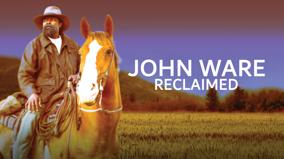The Secret Order
Phil Comeau shines a spotlight on the Ordre de Jacques-Cartier, a powerful secret society that operated from 1926 to 1965, infiltrating every sector of Canadian society and forging the fate of French-language communities. Through never-before-heard testimony from former members of the Order, along with historically accurate dramatic reconstructions, this film paints a gripping portrait of the social and political struggles of Canadian francophone-minority communities.

Details
Phil Comeau shines a spotlight on the Ordre de Jacques-Cartier, a powerful secret society that operated from 1926 to 1965, infiltrating every sector of Canadian society and forging the fate of French-language communities. Through never-before-heard testimony from former members of the Order, along with historically accurate dramatic reconstructions, this film paints a gripping portrait of the social and political struggles of Canadian francophone-minority communities.
-
participationLouis-Philippe AlbertHébert ArseneaultLouise BlanchardLucien BoudreauJeannine Boudreau-FinnMarthe CaronGérald CarrollEuclide ChiassonAlice CocunubovaJeanne-Mance CormierAldelbert DugasLouise ImbeaultAntoine LandryMathias LandrySylvain LanteigneÉdouard LeBlancFrançois LeblancClarence LeBretonEdmond PaulinAntoine RichardGuy RichardDenise RobillardLorio RoyBernard SavoieLouise SavoiePierrette SavoieBernard ThériaultLéon Thériault
-
actorAndré RoyGabriel RobichaudRaphaël ButlerJean-Philippe RaîcheLudger BeaulieuÉmilien CormierFélix BasqueGabriel Vincent DeslauriersMathieu ChouinardChristian Kit GoguenPhilip André ColletteGhislain BasqueLuc DoucetRosaire L'ItalienSébastien PoirierMaël Bisson
-
extraMarcel AllardLee CormierMichel CyrJules DesrosiersFrédéric DionÉloi DoucetAndré FrenetteBernard GalarneauPascal HachéPhilippe LandryRené LégèreJean-Marie NadeauDaniel PitreDenis RiouxClaude Sivret
-
directorPhil Comeau
-
scriptwriterPhil Comeau
-
researcherPhil Comeau
-
narratorPhil Comeau
-
editorLouis-Martin Paradis
-
director of photographyMario PaulinJérôme Sabourin
-
additional cameramanBernard FougèresÉtienne Boivin
-
location sound recorderSerge Arseneault
-
additional location sound recorderMarc LandryRichard LavoiePatrick Martin
-
animatorÉléonore Goldberg
-
production managerColette MallaisGeneviève Thibert
-
narration recording directorMichel Langlois
-
narration recordingJonathan Sonier
-
art directorXavier Georges
-
1st assistant directorDaniel Basque
-
2nd assistant directorMarie-Pierre Valay-Nadeau
-
3rd assistant directorAline Nicholson
-
set designerBernice Butler
-
propsAndrea Buckle
-
1st assistant cameramanÉtienne Boivin
-
2nd assistant cameramanÉtienne Boivin
-
boom operatorMarc Landry
-
script supervisorLouise Thériault
-
location directorMonique Malenfant
-
location managerMarie-France Jean
-
production assistantNicolas Boudreau
-
key gripÉric Arsenault
-
best boy gripJean-Michel Vienneau
-
gafferSimon Doucet
-
best boy gafferPaul Parker
-
carpenterSylvain Ward
-
costume designerLynn LosierClaudie Landry
-
head wardrobeAlexandra Johnston
-
set dresserMichelle Paulin
-
hairdresserMindy Morang
-
makeup artistRachel Noël
-
hair and make-up assistantChantal Ratcliffe
-
production coordinatorYousra Benziane
-
driverPierre RobichaudSophie Bélanger
-
still photographerLouis-Philippe Chiasson
-
casting directorMarie-Pierre Valay-Nadeau
-
Audition camera operatorPaul Arseneau
-
sound editorDaniel Toussaint
-
sound mixerJean Paul Vialard
-
online editorSerge Verreault
-
graphic designerJ.W. Jessy ForsythSamuel LeGresleyAlain OstiguyCynthia OuelletJulie Raymond
-
transcriptionPro Documents
-
subtitlesSette
-
closed captioningSette
-
foleySimon Meilleur
-
foley recordingGeoffrey Mitchell
-
archival researchEmma Brunet
-
rights clearancesEmma Brunet
-
additional researchDanika GourgonJairo Buitrago Ciro
-
historical consultantPhilippe VolpéBernard ThériaultFrançois Leblanc
-
script consultantBenoît Guichard
-
research consultantLuc BourdonPascale Savoie-Brideau
-
protagonist and extra consultantLuc Doucet
-
narration consultantJean-Philippe Raîche
-
original musicJean Massicotte
-
musicianJean MassicotteDominique Beauséjour-OstiguyJeanne CôtéVincent Delorme
-
marketing managerFrançois Jacques
-
line producerGeneviève Duguay
-
administratorGeneviève DuguaySia Koukoulas
-
senior production coordinatorAudrey Rétho
-
technical coordinatorJean-François Laprise
-
video technical supportPierre DupontPatrick TrahanMarie-Josée Gourde
-
legal counselJulie Patry
-
producerChristine Aubé
-
executive producerDenis McCreadyNathalie Cloutier
-
director of contentsJérôme Hellio
-
chief of original programmingGuy Boutin
-
principal coordinator of contentsJoannie Rollin
















